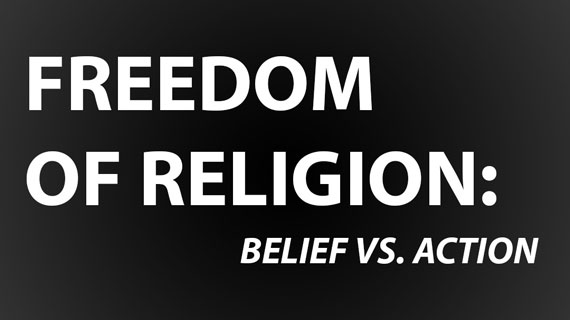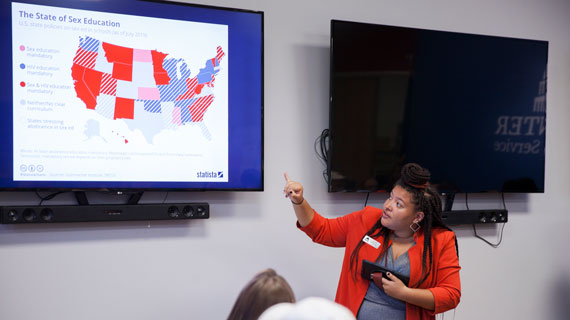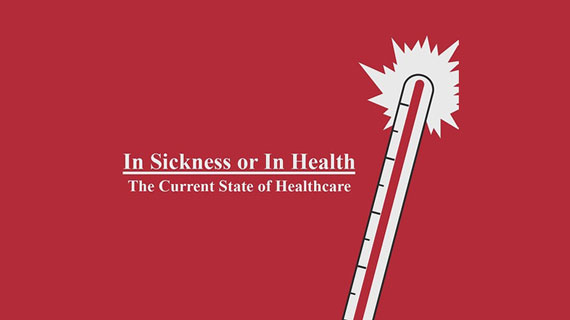Pizza & Politics - Freedom of Religion
Posted: October 18, 2017 | Author: Miles Anderson | Read Time: 4 minutes
 The Michael O. Leavitt Center for Politics and Public Service hosts Pizza & Politics every Wednesday at noon to discuss a current political topic. Leavitt Center student employees research the topic and moderate the conversation. These discussions expose students to a variety of important issues and encourages them to share their own perspectives while learning all sides of an issue. Free pizza is provided for all who attend.
The Michael O. Leavitt Center for Politics and Public Service hosts Pizza & Politics every Wednesday at noon to discuss a current political topic. Leavitt Center student employees research the topic and moderate the conversation. These discussions expose students to a variety of important issues and encourages them to share their own perspectives while learning all sides of an issue. Free pizza is provided for all who attend.
In a constantly changing political climate, it is essential to understand the basic rights guaranteed to every citizen by the Constitution. Moderators Jake Richins, a Masters of Public Administration student, and Miles Anderson, a senior political science and psychology major, chose to take on the taboo topic of religious freedom in the most recent Pizza and Politics discussion.
The right to religious freedom is found in the First Amendment to the Constitution. It guarantees two things: the government will not favor or target any specific religion or believers over non believers, and the government will not interfere with the free exercise of religion.
The Supreme Court has had dozens of landmark cases over the last 140 years dealing with the freedom of religion. The first case to deal with this specific right was Reynolds V. United States (1879) which established that while the government cannot create laws that interfere with belief, they can create laws that interfere with the actions that occur as a result of that belief. This particular case upheld a federal ban on the practice of polygamy.
These are a few of the questions posed to the audience during the discussion.
How has freedom of religion evolved since it was written in the first amendment?
Members of the audience indicated that the freedom of religion has become increasingly more complicated since the Constitution was written. While it initially was very clear what the right guaranteed, there are now laws and situations that present a grey area for what is appropriate action in the name of religion and which actions are or are not protected. Things like denying service to customers on religious grounds, refusing medical care due to a religious belief, and several others were mentioned as some of those grey areas.
What are your thoughts on religious exemptions for medical neglect charges?
This question was preceded by information pertaining to a few religious groups such as the Followers of Christ and Christian Science that do not allow their members to receive professional medical care but rely solely on faith healing and prayer. 34 states have religious exemption laws, which do not allow parents to be charged as harshly for child neglect or abuse if it is done on religious grounds.
The general consensus on this topic was that a child should be protected first and foremost in these scenarios. Regardless of religious belief, a child should be required by law to receive medical attention when it is needed. This consensus held during the conversation about Jehovah’s Witness parents not allowing their children to receive blood transfusions due to religious belief.
On the other side, a few comments were made about the deeply held beliefs of some of these religions. Jehovah’s Witnesses have a belief that if they do receive a blood transfusion, it disqualifies them for resurrection and eternal life after death. The parents do not want their children to have such a fate.
As law currently allows, consenting adults are able to turn down medical attention including blood transfusions, but the court has mandated a blood transfusion for a child against the will of the parents in several cases.
Where is the line between allowing free exercise of religion and favoring religious practices?
For many individuals in the audience, the line is drawn with matters of life and death. They think that religious practice should be able to function unhindered until it starts to impact whether or not someone will live or die. However, most of these individuals also expresses that an adult should be able to forego lifesaving practices themselves, but should not be able to make that decision for their children or congregation.
Other individuals expressed that this mindset is a slippery slope. To not allow a parent or guardian to opt their child out of a specific medical procedure is putting that decision making power into the hands of the government, and since when do we allow the government to choose our specific medical procedures that are performed on us or our families?
Accommodation vs. Separation
The discussion ended with an invitation to reflect on whether or not audience members were accommodationists at heart, or separationists. Accommodationists believe that religious beliefs and practices should be accommodated by the government as much as possible without favoring any one religion. Separationists believe the government should have nothing to do with religion at all and any sort of religious belief or practice should not be present in government settings. Most find themselves somewhere in between these two systems of belief.
This article was published more than 3 years ago and might contain outdated information or broken links. As a result, its accuracy cannot be guaranteed.
Tags: Blog Leavitt Center



